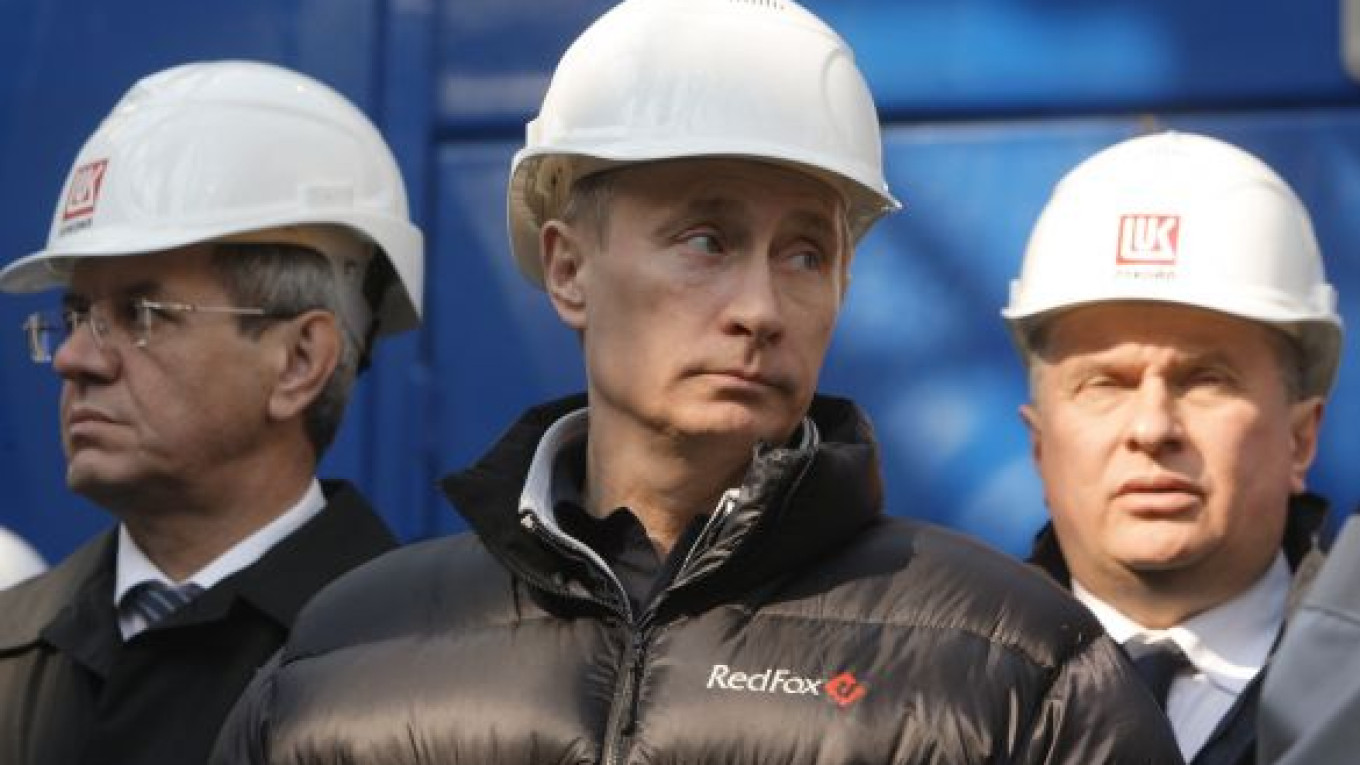Russia finally became a Caspian Sea oil producer on Wednesday as LUKoil began operating a modest offshore field in the presence of Prime Minister Vladimir Putin, who smeared some of the crude across his cheeks in celebration.
Kazakhstan and Azerbaijan have led the efforts to tap the sea's energy resources by enlisting such industry majors as ExxonMobil, BP and Chevron. Two other littoral states, Uzbekistan and Turkmenistan, have posted only minor outputs while Iran has yet to pump its first Caspian oil.
Putin flew in by helicopter to tour LUKoil's drilling rig, 180 kilometers from the city of Astrakhan, before pressing a token button to set the oil flowing. LUKoil chief Vagit Alekperov poured some of the crude into a safety helmet and offered Putin a chance to practice the industry tradition of washing one's face in oil from the first gusher to mark a well's success.
“Putin dipped his fingers in the crude and smeared it over his cheeks,” the Cabinet said in a statement describing the ceremony. “Deputy Prime Minister Igor Sechin and Vagit Alekperov, the accompanying delegation members, and employees on the rig followed his example.”
LUKoil spent 34.4 billion rubles ($1.2 billion) from 2004 to 2009 to bring the Yury Korchagin field into operation, the country's second-largest oil producer said in a statement. Alekperov told reporters on the rig that the spending had reached 40 billion rubles since exploration in the Russian section of the Caspian Sea started in 1995.
Oil and gas production in the Caspian Sea will significantly replenish global supplies, experts have said, because the area is believed to contain the world's third-largest energy reserves. The deposits there are a major prospective replacement for Russia's maturing west Siberian fields, in addition to the new provinces in east Siberia and the Arctic.
“Certainly, other Russian companies would love and will try to get positions in the Caspian, although practically none of them has offshore expertise,” said Elena Herold, a Russia expert at PFC Energy, a U.S.-based consultancy. “Offshore is Russia's next frontier that is much more promising than east Siberia.”
Further progress in capturing the Caspian and Arctic offshore energy resources — now classified as strategic assets and available only to state-owned Rosneft and Gazprom — will likely need foreign investment and, more important, technology, she said. Therefore, the Russian government looks set to amend legislation in favor of greater foreign involvement in such challenging projects.
So far, Russia appears to act on a case-by-case basis. President Dmitry Medvedev earlier this week invited Norway's StatoilHydro to cooperate with Gazprom in developing the Prirazlomnoye oil field in the Arctic waters. Gazprom is also considering a partnership with a foreign major to develop the Yamal gas fields.
But more liberal legislation may not be enough to make Western oil companies interested, said Alexei Kokin, an analyst at investment company Metropol. As another stimulus for the industry, the government has to offer tax breaks for work in harsh conditions at remote deposits, he said.
Putin said Wednesday that the government would study a proposal to exempt Caspian Sea projects from the hefty export duty, a measure that would likely upset the Finance Ministry.
“We'll see,” he said. “I don't rule it out.”
The Finance Ministry has been pushing for terminating existing export duty holidays for 22 east Siberian oil fields, as it is struggling to reduce the gaping budget deficit.
On the Caspian Sea, Korchagin's recoverable reserves amount to 28.8 million tons of crude and 63.3 billion cubic meters of gas, LUKoil said.
LUKoil has discovered five other offshore fields in the sea's Russian waters, most notably the Filanovsky field in 2005, which holds 220 million tons of oil and 40 billion cubic meters of gas. The company plans to bring it on line in 2015.
For comparison, Kazakhstan is hoping to lift 2 billion tons of crude from its supergiant Kashagan field, which is being developed under a production-sharing agreement with such foreign partners as Eni, Exxon, Shell and Total.
A Message from The Moscow Times:
Dear readers,
We are facing unprecedented challenges. Russia's Prosecutor General's Office has designated The Moscow Times as an "undesirable" organization, criminalizing our work and putting our staff at risk of prosecution. This follows our earlier unjust labeling as a "foreign agent."
These actions are direct attempts to silence independent journalism in Russia. The authorities claim our work "discredits the decisions of the Russian leadership." We see things differently: we strive to provide accurate, unbiased reporting on Russia.
We, the journalists of The Moscow Times, refuse to be silenced. But to continue our work, we need your help.
Your support, no matter how small, makes a world of difference. If you can, please support us monthly starting from just $2. It's quick to set up, and every contribution makes a significant impact.
By supporting The Moscow Times, you're defending open, independent journalism in the face of repression. Thank you for standing with us.
Remind me later.


